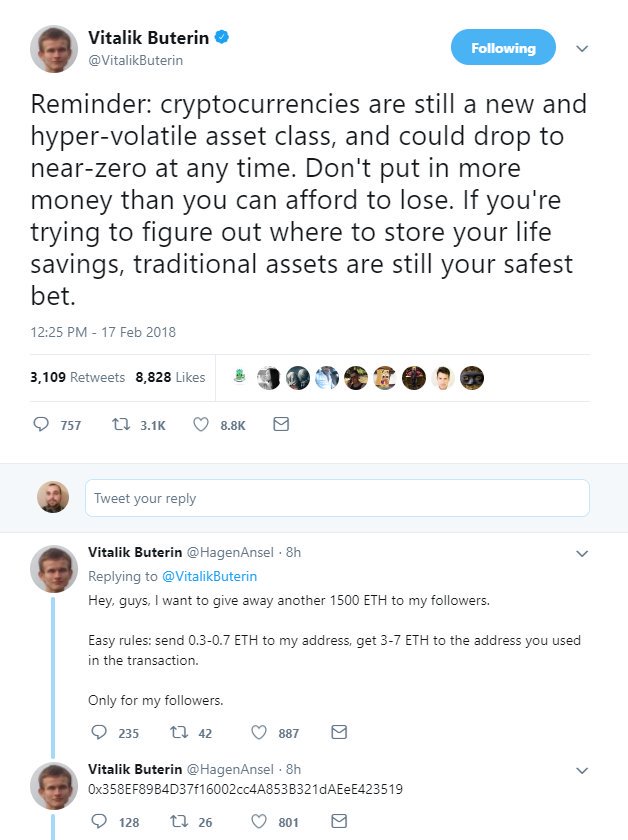
A British news agency teamed with Chainalysis to uncover just how rampant cryptocurrency Twitter scams are and the methods employed. Using well-regarded tech personalities such as Elon Musk, tens of thousands dollars have been swiped from unsuspecting admirers.
Also read: Bitcoiners Demand More Crypto CFDs and Spread-Betting in the UK
No, Elon Musk Is Not Giving Away Crypto
Senior developer at Chainalysis, Alvaro Sevilla, explained: “The differences in the way these funds are being handled, such as different withdrawal patterns and the use of different exchanges, is indicative of different copycats attempting to do the same scam. The simplicity of the attack, which requires little technical knowledge and preparation, also leads us to believe it’s a trend more than an organised attack,” he told Sky News.
The two outfits teamed up to uncover how rampant crypto Twitter scams are, using popular profiles such as Elon Musk, a well regarded tech savant and founder of companies such as Tesla and Space X, and Vitalik Buterin of Ethereum, who is generally respected in the crypto world proper. After having shared their report findings with Twitter, the team received this response from the social media platform: “We are aware of coordinated spam activity around cryptocurrencies and related software products. The malicious use of automation, impersonation, and other deliberate attempts to deceive are prohibited under the Twitter Rules.”

And yet many offending profiles remain, proving it a difficult task to police the problem from on-high. It’s probably more worthwhile to remind average and newer enthusiasts there is no such thing as a free lunch. If it appears to be too good to be true, it probably is. Though these well worn cliches seem downright obvious, it does appear some of the scammers attempted to feign legitimacy.
A higher-profile account establishes a pattern of syntax and image, and then an offending account merely copies its attributes down to the finest detail. A quick read inside a thread is usually the easiest way to catch unsuspecting eyeballs. The fraud profile at some point within the discussion offers to give free cryptocurrency.
Maniacally Simplistic
Words like “community” are tossed around, and the posing profile urges readers to zap a few small fractions to a wallet address with the promise of larger returns later. It has evidently worked so well, legitimate personalities have retaken to Twitter in order to warn followers. In the case of Mr. Buterin, he’s even changed his official Twitter name for emphasis.
“Our teams are overseeing a technological process of batch suspending these networks of offending accounts at scale and at speed,” Twitter explained. “If anyone sees suspicious account behaviour relating to these issues, they should block the user immediately and report them directly to our dedicated support teams.”

Alexander J Martin of Sky News noted, “The fake accounts have struck hundreds of times over the last two months, with the most successful taking away as much as £50,000 a day before using a range of exchanges to convert the proceeds into cash. In the largest scams, Sky News has observed hundreds of fake and automated accounts retweeting and liking the scam post, some responding with claims that they received money back; all providing the scammer with legitimacy and encouraging other users to take part.”
Within the Twitter thread, automated responses to the request by the scam profile issue encouraging testimonials. And if an initial skeptic were slick enough, the ethereum blockchain confirmed token amounts were indeed sent, perhaps lending an air, at first glance, of legitimacy. The team was unable to determine how much of the amounts were sent credulously by victims, versus what’sknown as “seed” amounts used to trick future victims sent by the fake profile itself to create a fear of missing out.
Stay Skeptical
“Our investigation found that some of these scams did indeed feature seed transfers,” Mr. Martin observed, “but these curiously were only utilised by the least successful of the scams. For the most successful – which received thousands of pounds from their victims – not a single transaction could be confidently flagged as a seed transfer.”

It wasn’t really any more than that. Create a fake profile and wallet. Invade a thread with carefully worded urgency. The user sees the amount as a pittance and sends it along for the gamble, and probably won’t even report having been duped. And, look, everyone else seems to be doing it and it worked for them!
For its part, Chainalysis “detected significantly different methodologies in terms of how the scammers attempted to launder their cryptocurrency, and to which exchanges their funds were sent in exchange for cash – suggesting that the campaigns were being run by copycats rather than a single conspiracy with an established method of operating.”
What do you think about such scams? Should Twitter become more restrictive or should users take greater care? Let us know in the comments!
Images via Pixabay, Chainalysis, Twitter.
At news.Bitcoin.com we do not censor any comment content based on politics or personal opinions. So, please be patient. Your comment will be published.
The post No, ”Elon Musk” on Twitter Is Not Giving Away Any Cryptocurrency appeared first on Bitcoin News.
Powered by WPeMatico
